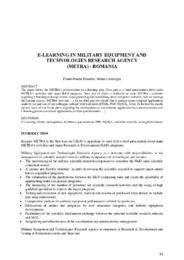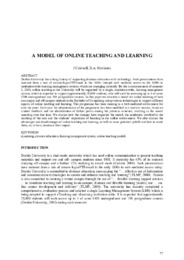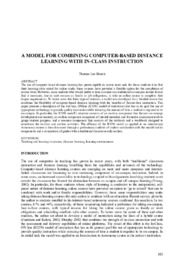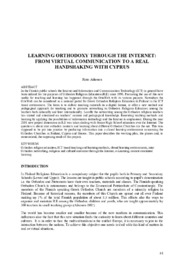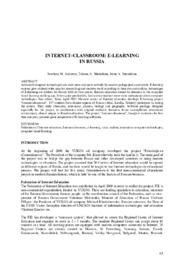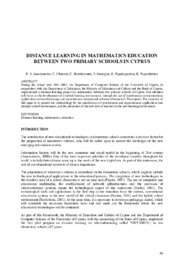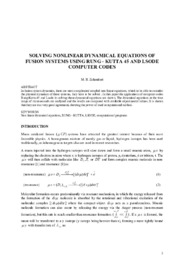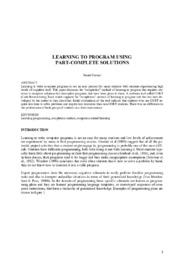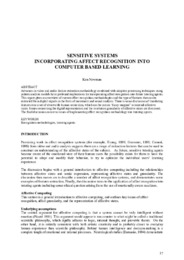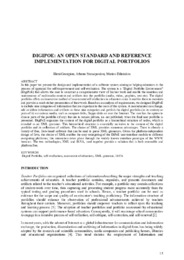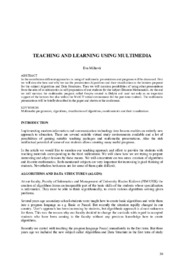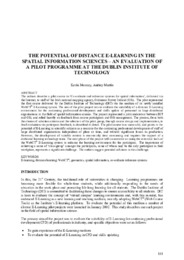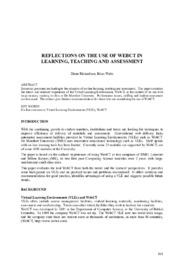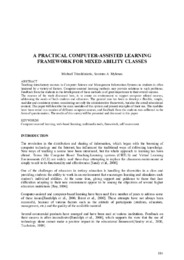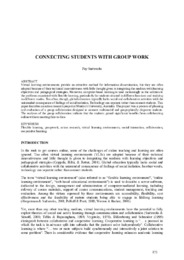CBLIS Conference Proceedings 2003 Volume I: New Technologies and their applications in education: Recent submissions
Now showing items 101-120 of 120
-
Teaching logic programming from a distance: an approach
(Department of Educational Sciences, University of Cyprus, 2003)In this paper a Networked Learning environment is presented for teaching Logic Programming from a Distance. After a short introduction to the Networked Learning approach to Open and Distance Learning, we present the reasons ... -
E-learning in military equipment and technologies research agency (metra) - Romania
(Department of Educational Sciences, University of Cyprus, 2003)The paper shows the METRA's achievements in e-learning area. First part is a brief presentation about main METRA’s activities and major R&D programs. Next part of paper is dedicated to main METRA’s activities regarding ... -
A model of online teaching and learning
(Department of Educational Sciences, University of Cyprus, 2003)Deakin University has a long history of supporting distance education with technology. Such presentations have matured from a mix of remote-login/FTP/email in the 1980s through web mediated access in the 1990s to ... -
Instructional software programs used in the Romanian higher education system
(Department of Educational Sciences, University of Cyprus, 2003)The social and political framework from Romania and the new technological revolution issued a revolution in the Romanian education system. There were initiated new forms of education and new instruction fields. Software ... -
A model for combining computer-based distance learning with in-class instruction
(Department of Educational Sciences, University of Cyprus, 2003)The use of computer-based distance learning has grown rapidly in recent years and, for those students who find their learning style suited for online study, these courses have provided a flexible option for the completion ... -
Learning orthodoxy through the internet: from virtual communication to a real handshaking with cyprus
(Department of Educational Sciences, University of Cyprus, 2003)In the Finnish public schools the Internet and Information and Communication Technology (ICT) in general have been utilized for the purposes of Orthodox Religious Education (R.E) since 1998. Promoting the use of this new ... -
Internet-classroom: e-learning in Russia
(Department of Educational Sciences, University of Cyprus, 2003)Advanced computer technologies are used more and more actively by modern pedagogical community. E-learning courses give students wide area for researching and creative work according to their own curriculum. Advantages of ... -
Distance learning in mathematics education between two primary schools in cyprus
(Department of Educational Sciences, University of Cyprus, 2003)During the school year 2001-2002, the Department of Computer Science of the University of Cyprus, in cooperation with the Department of Education, the Ministry of Education and Culture and the Bank of Cyprus, implemented ... -
Webcoct – a tool for producing web-based courses
(Department of Educational Sciences, University of Cyprus, 2003)The aim of the paper is to describe the project WeBCoCT (Web Based Courses Creating Tools) intended to become a learning environment to help academic teachers to introduce web-based courses. WeBCoCT has as its main goal ... -
Solving nonlinear dynamical equations of Fusion systems using rung - kutta 45 and lsode Computer codes
(Department of Educational Sciences, University of Cyprus, 2003)In fusion system dynamics, there are most complicated coupled non-linear equations, which to be able to consider the physical dynamics of these systems, they have to be solved . In this paper the applications of computer ... -
Learning to program using Part-complete solutions
(Department of Educational Sciences, University of Cyprus, 2003)Learning to write computer programs is not an easy process for many students with students experiencing high levels of cognitive load. This paper discusses the “completion” method of learning to program that requires ... -
Sensitive systems Incorporating affect recognition into Computer based learning
(Department of Educational Sciences, University of Cyprus, 2003)Advances in video and audio feature extraction methodology combined with adaptive processing techniques using pattern analysis models have profound implications for incorporating affect recognition into future tutoring ... -
Virtual optical illusions for creative learning
(Department of Educational Sciences, University of Cyprus, 2003)An amazing “rotating ring” optical illusion was studied in the frames of the students’ educational computer-based research work. Virtual images of differently shaped moving objects were simulated in QBasic 71, MS Visual ... -
Digipoe: an open standard and reference implementation for digital portfolios
(Department of Educational Sciences, University of Cyprus, 2003)In this paper we present the design and implementation of a software system aiming at helping educators in the process of appraisal for self-improvement and self-evaluation. The system is a "Digital Portfolio Environment" ... -
Teaching and learning using multimedia
(Department of Educational Sciences, University of Cyprus, 2003)In the contribution different approaches to using of multimedia presentations and programs will be discussed. First we will describe how and why we use the presentation Algorithms and their visualisation in the lectures ... -
The potential of distance e-learning in the Spatial information sciences – an evaluation of a pilot programme at the dublin institute of Technology
(Department of Educational Sciences, University of Cyprus, 2003)The authors describe a pilot course in ‘Co-ordinate and reference systems for spatial information’, delivered via the Internet, to staff of the Irish national mapping agency, Ordnance Survey Ireland (OSi). The pilot ... -
Reflections on the use of webct in Learning, teaching and assessment
(Department of Educational Sciences, University of Cyprus, 2003)Economic pressures are leading to the adoption of on-line learning, teaching and assessment. This paper considers the tutors' and students' experience of the Virtual Learning Environment, WebCT, in the context of its use ... -
A practical computer-assisted learning framework for mixed ability classes
(Department of Educational Sciences, University of Cyprus, 2003)Teaching introductory courses in Computer Science and Management Information Systems to students is often hindered by a variety of factors. Computer-assisted learning methods may provide solutions to such problems. Feedback ... -
Connecting students with group work
(Department of Educational Sciences, University of Cyprus, 2003)Virtual learning environments provide an attractive method for information dissemination, but they are often adopted because of their technical innovativeness with little thought given to integrating the medium with learning ... -
Telecommunications technologies and Curriculum development: the case of a virtual High school project
(Department of Educational Sciences, University of Cyprus, 2003)In this paper we present the lessons we learned from developing online classes for a virtual high school (LUDAVHS) project and discuss the implications for teaching science using telecommunication technologies. Emphasis ...

